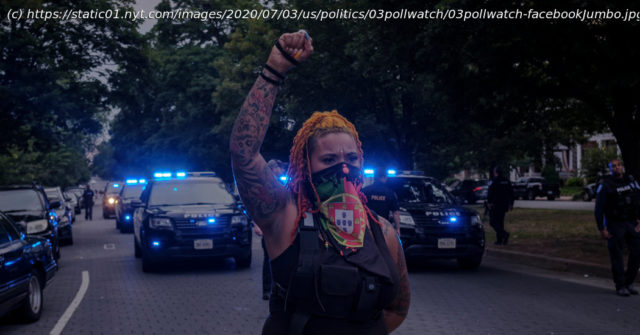As they learn more about it, voters have shown some receptiveness to the phrase, polling suggests. But they largely want to reinvest resources, not eliminate departments.
Welcome to Poll Watch, our weekly look at polling data and survey research on the candidates, voters and issues that will shape the 2020 election.
Just over a month ago, the term “defund the police” was almost entirely the domain of activists and academics. Now it’s a household phrase, with a huge majority of Americans telling pollsters they recognize it.
But what exactly does it mean? And when Americans hear it, what do they think of? For proponents of police reform, is it a useful slogan — or dangerously alienating?
In the immediate aftermath of George Floyd’s killing in late May at the hands of Minneapolis police officers, calls to sharply cut police funding appeared potentially radioactive. Beyond some high-profile progressive figures, including a number of young politicians of color, few leading Democrats embraced the term.
Joseph R. Biden Jr., the party’s presumptive presidential nominee, staked out his position early last month: “I do not support defunding police,” he wrote in a USA Today op-ed article, pushing a range of reforms instead.
But as people have learned more about the term and some city governments have even put it into action, Americans have shown some receptiveness to it. Recent polling suggests that many Americans have come to understand the phrase as a call not to simply eliminate the keepers of the peace, but to reinvest a portion of their funding in other programs and crime prevention techniques.
Running for Congress in New York, Mondaire Jones — a progressive political newcomer who appears poised to win his still-undecided election in a suburban district — articulated that vision last month, when he endorsed “defunding police and reinvesting this money in health, education, and alternatives to incarceration.”
Pollsters at PerryUndem, a public opinion research firm, have been studying the public’s response to the protests, and they said they had found voters — particularly Democrats — more curious about than dismissive of the term.
“It had such an initial backlash that people had to explain: ‘Well, no, here’s what it means,’” Tresa Undem, a partner with the firm, said in an interview. “It was a small window when a lot of learning happened, and it’s these windows when things change.”
Polls have consistently shown that an overwhelming share of Americans see racism as a big problem in the country, and that a slimmer but still-strong majority view Mr. Floyd’s death as part of a systemic problem with policing in America.






